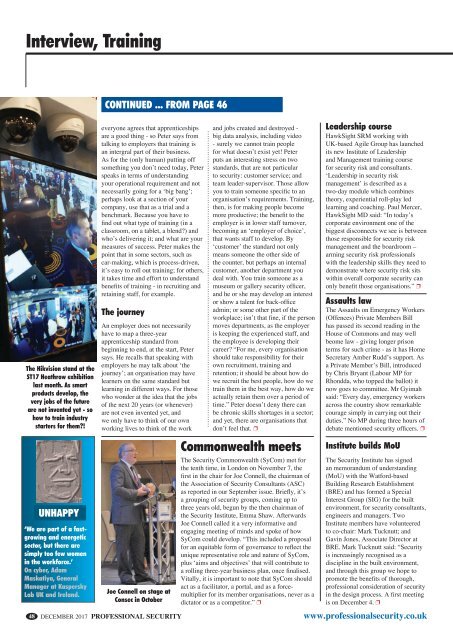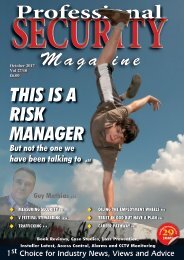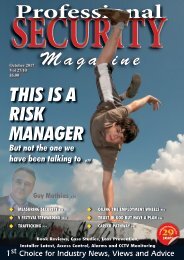Draft27-12
Create successful ePaper yourself
Turn your PDF publications into a flip-book with our unique Google optimized e-Paper software.
Interview, Training<br />
continued ... from page 46<br />
The Hikvision stand at the<br />
ST17 Heathrow exhibition<br />
last month. As smart<br />
products develop, the<br />
very jobs of the future<br />
are not invented yet - so<br />
how to train industry<br />
starters for them?!<br />
everyone agrees that apprenticeships<br />
are a good thing - so Peter says from<br />
talking to employers that training is<br />
an intergral part of their business.<br />
As for the (only human) putting off<br />
something you don’t need today, Peter<br />
speaks in terms of understanding<br />
your operational requirement and not<br />
necessarily going for a ‘big bang’;<br />
perhaps look at a section of your<br />
company, use that as a trial and a<br />
benchmark. Because you have to<br />
find out what type of training (in a<br />
classroom, on a tablet, a blend?) and<br />
who’s delivering it; and what are your<br />
measures of success. Peter makes the<br />
point that in some sectors, such as<br />
car-making, which is process-driven,<br />
it’s easy to roll out training; for others,<br />
it takes time and effort to understand<br />
benefits of training - in recruiting and<br />
retaining staff, for example.<br />
The journey<br />
An employer does not necessarily<br />
have to map a three-year<br />
apprenticeship standard from<br />
beginning to end, at the start, Peter<br />
says. He recalls that speaking with<br />
employers he may talk about ‘the<br />
journey’; an organisation may have<br />
learners on the same standard but<br />
learning in different ways. For those<br />
who wonder at the idea that the jobs<br />
of the next 20 years (or whenever)<br />
are not even invented yet, and<br />
we only have to think of our own<br />
working lives to think of the work<br />
and jobs created and destroyed -<br />
big data analysis, including video<br />
- surely we cannot train people<br />
for what doesn’t exist yet! Peter<br />
puts an interesting stress on two<br />
standards, that are not particular<br />
to security: customer service; and<br />
team leader-supervisor. Those allow<br />
you to train someone specific to an<br />
organisation’s requirements. Training,<br />
then, is for making people become<br />
more productive; the benefit to the<br />
employer is in lower staff turnover,<br />
becoming an ‘employer of choice’,<br />
that wants staff to develop. By<br />
‘customer’ the standard not only<br />
means someone the other side of<br />
the counter, but perhaps an internal<br />
customer, another department you<br />
deal with. You train someone as a<br />
museum or gallery security officer,<br />
and he or she may develop an interest<br />
or show a talent for back-office<br />
admin; or some other part of the<br />
workplace; isn’t that fine, if the person<br />
moves departments, as the employer<br />
is keeping the experienced staff, and<br />
the employee is developing their<br />
career? “For me, every organisation<br />
should take responsibility for their<br />
own recruitment, training and<br />
retention; it should be about how do<br />
we recruit the best people, how do we<br />
train them in the best way, how do we<br />
actually retain them over a period of<br />
time.” Peter doesn’t deny there can<br />
be chronic skills shortages in a sector;<br />
and yet, there are organisations that<br />
don’t feel that. p<br />
Leadership course<br />
HawkSight SRM working with<br />
UK-based Agile Group has launched<br />
its new Institute of Leadership<br />
and Management training course<br />
for security risk and consultants.<br />
‘Leadership in security risk<br />
management’ is described as a<br />
two-day module which combines<br />
theory, experiential roll-play led<br />
learning and coaching. Paul Mercer,<br />
HawkSight MD said: “In today’s<br />
corporate environment one of the<br />
biggest disconnects we see is between<br />
those responsible for security risk<br />
management and the boardroom –<br />
arming security risk professionals<br />
with the leadership skills they need to<br />
demonstrate where security risk sits<br />
within overall corporate security can<br />
only benefit those organisations.” p<br />
Assaults law<br />
The Assaults on Emergency Workers<br />
(Offences) Private Members Bill<br />
has passed its second reading in the<br />
House of Commons and may well<br />
beome law - giving longer prison<br />
terms for such crime - as it has Home<br />
Secretary Amber Rudd’s support. As<br />
a Private Member’s Bill, introduced<br />
by Chris Bryant (Labour MP for<br />
Rhondda, who topped the ballot) it<br />
now goes to committee. Mr Gyimah<br />
said: “Every day, emergency workers<br />
across the country show remarkable<br />
courage simply in carrying out their<br />
duties.” No MP during three hours of<br />
debate mentioned security officers. p<br />
UNHAPPY<br />
‘We are part of a fastgrowing<br />
and energetic<br />
sector, but there are<br />
simply too few women<br />
in the workforce.’<br />
On cyber, Adam<br />
Maskatiya, General<br />
Manager at Kaspersky<br />
Lab UK and Ireland.<br />
Joe Connell on stage at<br />
Consec in October<br />
Commonwealth meets<br />
The Security Commonwealth (SyCom) met for<br />
the tenth time, in London on November 7, the<br />
first in the chair for Joe Connell, the chairman of<br />
the Association of Security Consultants (ASC)<br />
as reported in our September issue. Briefly, it’s<br />
a grouping of security groups, coming up to<br />
three years old, begun by the then chairman of<br />
the Security Institute, Emma Shaw. Afterwards<br />
Joe Connell called it a very informative and<br />
engaging meeting of minds and spoke of how<br />
SyCom could develop. “This included a proposal<br />
for an equitable form of governance to reflect the<br />
unique representative role and nature of SyCom,<br />
plus ‘aims and objectives’ that will contribute to<br />
a rolling three-year business plan, once finalised.<br />
Vitally, it is important to note that SyCom should<br />
act as a facilitator, a portal, and as a forcemultiplier<br />
for its member organisations, never as a<br />
dictator or as a competitor.” p<br />
Institute builds MoU<br />
The Security Institute has signed<br />
an memorandum of understanding<br />
(MoU) with the Watford-based<br />
Building Research Establishment<br />
(BRE) and has formed a Special<br />
Interest Group (SIG) for the built<br />
environment, for security consultants,<br />
engineers and managers. Two<br />
Institute members have volunteered<br />
to co-chair: Mark Tucknutt; and<br />
Gavin Jones, Associate Director at<br />
BRE. Mark Tucknutt said: “Security<br />
is increasingly recognised as a<br />
discipline in the built environment,<br />
and through this group we hope to<br />
promote the benefits of thorough,<br />
professional consideration of security<br />
in the design process. A first meeting<br />
is on December 4. p<br />
48 DECEMBER 2017 PROFESSIONAL SECURITY www.professionalsecurity.co.uk<br />
p46,8 TrgInterv 27-<strong>12</strong>.indd 2 18/11/2017 11:53










